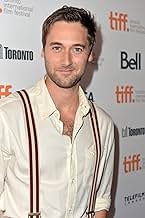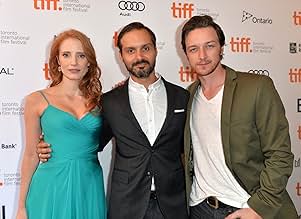IMDb-BEWERTUNG
6,8/10
10.618
IHRE BEWERTUNG
Füge eine Handlung in deiner Sprache hinzuTold from the male perspective, the story of a couple trying to reclaim the life and love they once knew and pick up the pieces of a past that may be too far gone.Told from the male perspective, the story of a couple trying to reclaim the life and love they once knew and pick up the pieces of a past that may be too far gone.Told from the male perspective, the story of a couple trying to reclaim the life and love they once knew and pick up the pieces of a past that may be too far gone.
- Auszeichnungen
- 1 Gewinn & 3 Nominierungen insgesamt
Empfohlene Bewertungen
When this intriguing and original film was first screened at the Toronto International Film Festival on September 9, it surprisingly didn't have a release date. Fortunately, The Globe and Mail reports that less than 24 hours after viewing its Toronto screening, distributor Harvey Weinstein scooped it up. And that's a very good thing — no one should have to miss out on this clever and creative story-telling.
Imagine, for a second, that a friend comes to tell you about his terrible break-up. You hear about how hurt he is and how devastatingly it ended, and you feel for him 100 per cent. But then a few days later, you happen to run into his ex and you hear her side of the story. Suddenly, the break-up doesn't seem so clear. Who's "at fault" is murky, and what really brought the relationship to a close is a complex and intricate issue. That's precisely the mystery that Ned Benson brings to us in his new film, The Disappearance of Eleanor Rigby: Him and Her. Rather than simply showing the complex issues of a marriage from one character's point of view, Benson created two separate but united films — one told from the point of view of the husband, and the second from that of the wife. Not only does Benson tackle the issue of perspective — but he also weaves in the subject of memory. What might initially seem like continuity errors between the two halves are quickly revealed to have far more significance and ultimately tell an equally affecting tale. Some differences are subtle, while some are striking — but all showcase how our perspectives subjective, but so too are our memories.
At the beginning of the movie, the lively and upbeat Conor (James McAvoy) and Eleanor (Jessica Chastain) are in a quickly disintegrating marriage. What follows are the stories of how each of them got to where they are, as individuals and as a couple, and where they hope to go. McAvoy and Chastain have proved themselves to be brilliant actors in their own rights — and, if you can believe it, they're even more dynamic and captivating together. Their deep understanding of the story paired with their commitment to the roles and intense chemistry makes this story enthralling to watch from beginning to end.
The one aspect that may have made it harder for this exceptional film to get a wide release is its length. Since it's essentially two separate films, it has a running time of three hours and ten minutes — and not everyone has the patience required. To combat this challenge, The Globe and Mail notes there has been some talk of showing the films each on their own rather than as a combined unit. Although the performances are spectacular, the writing compelling, and the direction well done in each film, it seems to me that a lot of the brilliance of the film's structure would be lost without the two parts together. It's the clever balancing act between the two perspectives and the way they address how much we can trust our memories that make The Disappearance of Eleanor Rigby: Him and Her so unique and captivating. If you were to take away the "Him and Her" in favour of one pronoun or the other, I feel you would lose a great deal of what makes the film special. It might be a longer haul as far as romantic dramas go, but I beg you to grab your popcorn — and a sizeable coffee if necessary — and settle in for the full three hours. This powerful and invigorating tale is worth the time.
Imagine, for a second, that a friend comes to tell you about his terrible break-up. You hear about how hurt he is and how devastatingly it ended, and you feel for him 100 per cent. But then a few days later, you happen to run into his ex and you hear her side of the story. Suddenly, the break-up doesn't seem so clear. Who's "at fault" is murky, and what really brought the relationship to a close is a complex and intricate issue. That's precisely the mystery that Ned Benson brings to us in his new film, The Disappearance of Eleanor Rigby: Him and Her. Rather than simply showing the complex issues of a marriage from one character's point of view, Benson created two separate but united films — one told from the point of view of the husband, and the second from that of the wife. Not only does Benson tackle the issue of perspective — but he also weaves in the subject of memory. What might initially seem like continuity errors between the two halves are quickly revealed to have far more significance and ultimately tell an equally affecting tale. Some differences are subtle, while some are striking — but all showcase how our perspectives subjective, but so too are our memories.
At the beginning of the movie, the lively and upbeat Conor (James McAvoy) and Eleanor (Jessica Chastain) are in a quickly disintegrating marriage. What follows are the stories of how each of them got to where they are, as individuals and as a couple, and where they hope to go. McAvoy and Chastain have proved themselves to be brilliant actors in their own rights — and, if you can believe it, they're even more dynamic and captivating together. Their deep understanding of the story paired with their commitment to the roles and intense chemistry makes this story enthralling to watch from beginning to end.
The one aspect that may have made it harder for this exceptional film to get a wide release is its length. Since it's essentially two separate films, it has a running time of three hours and ten minutes — and not everyone has the patience required. To combat this challenge, The Globe and Mail notes there has been some talk of showing the films each on their own rather than as a combined unit. Although the performances are spectacular, the writing compelling, and the direction well done in each film, it seems to me that a lot of the brilliance of the film's structure would be lost without the two parts together. It's the clever balancing act between the two perspectives and the way they address how much we can trust our memories that make The Disappearance of Eleanor Rigby: Him and Her so unique and captivating. If you were to take away the "Him and Her" in favour of one pronoun or the other, I feel you would lose a great deal of what makes the film special. It might be a longer haul as far as romantic dramas go, but I beg you to grab your popcorn — and a sizeable coffee if necessary — and settle in for the full three hours. This powerful and invigorating tale is worth the time.
It's very odd how much The Disappearance of Eleanor Rigby: Her gets right that Him just can't measure up to. I'm not sure whether it's because I watched it second, but it's way more clumsily executed. While it does pay off a lot of things set up in Her (and I imagine it'll work vice versa) when it offers an alternate perspective on a scene, that's its only strength. Where Her approached sappiness with its insights on romance, Him too often breaches that mark. It's a more lightweight film, which comes with its own delights with Bill Hadar and that subplot, but moments which elicited tears in Her revisited here had little effect. I'm sure that's not a case of diminishing returns. McAvoy is reliably great, not quite as good as Chastain in Her, but again he bolsters the material. The problem with this portion of the pair is that it paints Eleanor Rigby in a very unappealing light, one I hadn't even considered with Her. Here, I don't see why he's chasing her so much. Nevertheless, Him is still a very good film for when it does hit the spot, just doesn't match its counterpart.
7/10
7/10
The sadness of being an incorrigible completist, I have to finish all these three films before writing my review, Ned Benson's ambitious feature-length debut is a post-trauma story of a young couple Conor (McAvoy) and Eleanor (Chastain) in New York after losing their child in an unspecified accident, HIM centres on Conor and HER centres on Eleanor in the same time period, then interweaves these two versions together, there arrives THEM, one can get an overall view of their paralleled life. So basically, I have watched the same movie twice, and certain scenes three times where the path of Conor and Eleanor converges.
The premise is soundingly intriguing, as often cornily referred as two separate cerebral hemispheres, the film allows viewers to observe how men and women think and act differently towards the same scenario, in this case, a heartbroken tragedy. In HIM, the movie starts with one of their most intimate memory before their bereavement, an inadvertent thrill in their ordinary life sparks strong romance with Conor amorously says: "There is only one heart in this body, please have mercy on me". Then it jumps to several months of the aftermath, Eleanor uses an extreme method to declare that their life can not sustain as the status quo, they need to take a break. Conor doesn't understand why she needs her alone-time for her grievance, he is equally heartbroken, but he is ready to move on, leaving the tragedy behind with a seal on it, not to mention and keeps living on afterwards. He opens a bar with his best friend Stuart (Hader) and a flirty barmaid Alexis (Arianda) who is ready to "falling in love with him madly if he allows her". Meanwhile his father Spencer (Hinds) owns a successful restaurant named after Conor's mother, whom he dumped ages ago, it is also a thorny decision for him whether or not to swallow his pride to admit failure and take the restaurant inasmuch as his bar is on the brink of bankrupt, it is a privileged struggle as a rich kid's blues.
In HER, no romantic prologue, Eleanor is introduced in her abrupt suicidal behaviour, then she returns to her bourgeoisie parents living in the suburb (played by Hurt and Huppert, he is a university professor and she is French), she goes back to the college and takes a class of professor Lillian Friedman (Davis), before long Conor finds out her whereabouts, stalks her in the street, in the classroom and eagerly to reconnect. As Hurt carefully phrases "Tragedy is a foreign country, we don't know how to talk to the natives", Conor's tentative makeup doesn't work, Eleanor needs to be over-indulged in the past for some time before finally moving forward, plus, she can spend all the time she wants in Paris, to heal her wounds, after a whimsical but failed reconnection during a pouring rain and a vis-a-vis opening-up in the middle of the night, it is rather tedious for her to realise that she should take a real break out of the Tri-state area. The disparity erected between each and every individuals cannot be compromised, only when they arrive in the same page with the same pace, they may have a chance to start anew as a couple.
As often as he can, Benson intends to throw snappy verbal rejoinders to sound posh or vivacious, but most of the time they are ill-placed ("Now YOU sound maternal" throwaway) and uninspired, as most of the dialogues verge on beating around the bush either without any substantial function or being painstakingly predictable. Yet the two leads is recommendable in any rate, so it is safe to say the film is perfect for McAvoy and Chastain's stalwarts, both set off a full gamut of emotional overhaul and not to mention many close-ups to let their fans luxuriate in the idolatry. Among the eclectic supporting cast, Huppert radiates in every scene simply by holding a glass of red wine in her hand, and Davis thrusts her raw gravitas into her casual bantering with her THE HELP (2010, 8/10) co- star, as an outsider, she is the one who pierces through the surface without any scruples, only if she could have more screen time in it.
The indie soundtrack is an understandable trapping of the prevalent mumblecore output, it's ambient, moody and meditative, tailor-made to outline the disposition of the storyline. Collectively speaking, the films attempt to be artistic and unique, it could have hit the bull- eye with all such a talented group, only if it could subtract the permeating tint of narcissism, and conjure up some more salient epiphany. At last, the THEM version abridges some minor sequences and merges HIM and HER with an intact take on the proceedings. There is no new scenes added, so one can choose to watch HIM and HER, or THEM, either is sufficiently competent to disclose its allure and drawbacks.
The premise is soundingly intriguing, as often cornily referred as two separate cerebral hemispheres, the film allows viewers to observe how men and women think and act differently towards the same scenario, in this case, a heartbroken tragedy. In HIM, the movie starts with one of their most intimate memory before their bereavement, an inadvertent thrill in their ordinary life sparks strong romance with Conor amorously says: "There is only one heart in this body, please have mercy on me". Then it jumps to several months of the aftermath, Eleanor uses an extreme method to declare that their life can not sustain as the status quo, they need to take a break. Conor doesn't understand why she needs her alone-time for her grievance, he is equally heartbroken, but he is ready to move on, leaving the tragedy behind with a seal on it, not to mention and keeps living on afterwards. He opens a bar with his best friend Stuart (Hader) and a flirty barmaid Alexis (Arianda) who is ready to "falling in love with him madly if he allows her". Meanwhile his father Spencer (Hinds) owns a successful restaurant named after Conor's mother, whom he dumped ages ago, it is also a thorny decision for him whether or not to swallow his pride to admit failure and take the restaurant inasmuch as his bar is on the brink of bankrupt, it is a privileged struggle as a rich kid's blues.
In HER, no romantic prologue, Eleanor is introduced in her abrupt suicidal behaviour, then she returns to her bourgeoisie parents living in the suburb (played by Hurt and Huppert, he is a university professor and she is French), she goes back to the college and takes a class of professor Lillian Friedman (Davis), before long Conor finds out her whereabouts, stalks her in the street, in the classroom and eagerly to reconnect. As Hurt carefully phrases "Tragedy is a foreign country, we don't know how to talk to the natives", Conor's tentative makeup doesn't work, Eleanor needs to be over-indulged in the past for some time before finally moving forward, plus, she can spend all the time she wants in Paris, to heal her wounds, after a whimsical but failed reconnection during a pouring rain and a vis-a-vis opening-up in the middle of the night, it is rather tedious for her to realise that she should take a real break out of the Tri-state area. The disparity erected between each and every individuals cannot be compromised, only when they arrive in the same page with the same pace, they may have a chance to start anew as a couple.
As often as he can, Benson intends to throw snappy verbal rejoinders to sound posh or vivacious, but most of the time they are ill-placed ("Now YOU sound maternal" throwaway) and uninspired, as most of the dialogues verge on beating around the bush either without any substantial function or being painstakingly predictable. Yet the two leads is recommendable in any rate, so it is safe to say the film is perfect for McAvoy and Chastain's stalwarts, both set off a full gamut of emotional overhaul and not to mention many close-ups to let their fans luxuriate in the idolatry. Among the eclectic supporting cast, Huppert radiates in every scene simply by holding a glass of red wine in her hand, and Davis thrusts her raw gravitas into her casual bantering with her THE HELP (2010, 8/10) co- star, as an outsider, she is the one who pierces through the surface without any scruples, only if she could have more screen time in it.
The indie soundtrack is an understandable trapping of the prevalent mumblecore output, it's ambient, moody and meditative, tailor-made to outline the disposition of the storyline. Collectively speaking, the films attempt to be artistic and unique, it could have hit the bull- eye with all such a talented group, only if it could subtract the permeating tint of narcissism, and conjure up some more salient epiphany. At last, the THEM version abridges some minor sequences and merges HIM and HER with an intact take on the proceedings. There is no new scenes added, so one can choose to watch HIM and HER, or THEM, either is sufficiently competent to disclose its allure and drawbacks.
The Disappearance of Eleanor Rigby
Him (2013)
This is part of a two segment movie about a couple recovering from tragedy (losing a young child) told from the point of view of the mother and father separately. Like "Her," this one is mostly about the protagonist, with some key elements from the relationship unravelling. And like "Her" there is very little about the grieving or the actual tragedy. We are supposed to be dropped into their lives long enough later to be in their individual recoveries.
The father here is James McAvoy, and he's good, but he doesn't have the intensity and range of Jessica Chastain, who carries the "Her" movie so well. The supporting cast is thinner here, too—Viola Davis makes only a tangential appearance, and there is little of Isabelle Hupert and none of William Hurt, who both make "Her" rather special. So here we have the somewhat clichéd "friends at a bar" as McAvoy's clan, and it's nothing much.
It's tough to judge all of this because I saw "Her" first and so the plot itself was new to me then, and here it is simply the retelling of the same story. So what was most interesting of all was the re-telling of the overlapping sections, seeing the events from different eyes. This wasn't pushed hard, which is fine (this is no "Rashoman"), and so it just makes the pair of movies gel.
Beware of the third movie, however—which has the suffix: "Them." I haven't see it (and won't), but it is apparently a mash of the first two, a shortened single version that apparently lacks the potentially probing aspects of the two halves seen singley or together. The two separate movies are sometimes shown or released as a marathon version that is not the same as the shortened, combined Them. So see one of the two single versions and go from there.
Advice: "Him" alone is not as satisfying as "Her," for commons reasons like the depth of acting as well as the range of characters. Chastain's version is better by far, but if you do see "Her" first, I think "Him" adds another layer that is satisfying, and not redundant except in just the right moments.
This is part of a two segment movie about a couple recovering from tragedy (losing a young child) told from the point of view of the mother and father separately. Like "Her," this one is mostly about the protagonist, with some key elements from the relationship unravelling. And like "Her" there is very little about the grieving or the actual tragedy. We are supposed to be dropped into their lives long enough later to be in their individual recoveries.
The father here is James McAvoy, and he's good, but he doesn't have the intensity and range of Jessica Chastain, who carries the "Her" movie so well. The supporting cast is thinner here, too—Viola Davis makes only a tangential appearance, and there is little of Isabelle Hupert and none of William Hurt, who both make "Her" rather special. So here we have the somewhat clichéd "friends at a bar" as McAvoy's clan, and it's nothing much.
It's tough to judge all of this because I saw "Her" first and so the plot itself was new to me then, and here it is simply the retelling of the same story. So what was most interesting of all was the re-telling of the overlapping sections, seeing the events from different eyes. This wasn't pushed hard, which is fine (this is no "Rashoman"), and so it just makes the pair of movies gel.
Beware of the third movie, however—which has the suffix: "Them." I haven't see it (and won't), but it is apparently a mash of the first two, a shortened single version that apparently lacks the potentially probing aspects of the two halves seen singley or together. The two separate movies are sometimes shown or released as a marathon version that is not the same as the shortened, combined Them. So see one of the two single versions and go from there.
Advice: "Him" alone is not as satisfying as "Her," for commons reasons like the depth of acting as well as the range of characters. Chastain's version is better by far, but if you do see "Her" first, I think "Him" adds another layer that is satisfying, and not redundant except in just the right moments.
One thing that I do like about this film is that when this movie does show scenes where the characters are in love with each other, it's very well done. At least the performances are. When these two are in a scene together, you can get a good vibe of what they're feeling. It could be them in love, depressed, scared, or anything that involves emotion. This movie does focus on the emotion of James McAvoy.
It's not just the emotion however. You do know very well that McAvoy is still in love, he cares, and the movie does focus on that, but it also focuses on his work job. That may not seem like it is interesting, but it does add a bit more to what McAvoy's character is dealing with, because it's not going completely well with his work space either.
The title of the movie is a good one. It seems like it came from a novel you would find somebody reading at a coffee store, but it is an original title and film. This movie does a decent job on it. Chastain isn't in this movie that much, you are curious where she is when she's not involved in the story. When she does show up, you question what her motivation is to why we're seeing her, and part of the fun is that we have to see the other film to see her motivations and other stuff.
My few complaints about this film is that the concept of this story does seem interesting, however it isn't a very compelling story. Like I said, part of it is because we don't know what Chastain's character is thinking, but nothing really grabs you unless it's a scene with McAvoy and Chastain together.
Which leads me to a specific scene involved with them. Now I'm not going to spoil it because spoilers are no fun. We really don't know what the real reason is why these two split up and when the movie does reveal why, it gives a bigger impact on how the characters reacted when they're together, which to me, makes those scenes a tiny bit more enjoyable.
Also without spoiling anything about the ending, it was very abrupt. I'm pretty sure there is more to it when you see the Her film, but that ending really seemed unnecessary.
The concept of the story is being told is interesting. But when it only focuses on James McAvoy's character, the movie isn't the most entertaining and compelling thing. Yet it when McAvoy and Chastain share the screen, it gets interesting because you can feel their emotions and those scenes with them are well done and compelling, especially one scene that is a big part of the story. The ending may make more sense if both films are scene, but Him is a decent movie that might be even more enjoyable once Her is watched.
It's not just the emotion however. You do know very well that McAvoy is still in love, he cares, and the movie does focus on that, but it also focuses on his work job. That may not seem like it is interesting, but it does add a bit more to what McAvoy's character is dealing with, because it's not going completely well with his work space either.
The title of the movie is a good one. It seems like it came from a novel you would find somebody reading at a coffee store, but it is an original title and film. This movie does a decent job on it. Chastain isn't in this movie that much, you are curious where she is when she's not involved in the story. When she does show up, you question what her motivation is to why we're seeing her, and part of the fun is that we have to see the other film to see her motivations and other stuff.
My few complaints about this film is that the concept of this story does seem interesting, however it isn't a very compelling story. Like I said, part of it is because we don't know what Chastain's character is thinking, but nothing really grabs you unless it's a scene with McAvoy and Chastain together.
Which leads me to a specific scene involved with them. Now I'm not going to spoil it because spoilers are no fun. We really don't know what the real reason is why these two split up and when the movie does reveal why, it gives a bigger impact on how the characters reacted when they're together, which to me, makes those scenes a tiny bit more enjoyable.
Also without spoiling anything about the ending, it was very abrupt. I'm pretty sure there is more to it when you see the Her film, but that ending really seemed unnecessary.
The concept of the story is being told is interesting. But when it only focuses on James McAvoy's character, the movie isn't the most entertaining and compelling thing. Yet it when McAvoy and Chastain share the screen, it gets interesting because you can feel their emotions and those scenes with them are well done and compelling, especially one scene that is a big part of the story. The ending may make more sense if both films are scene, but Him is a decent movie that might be even more enjoyable once Her is watched.
Wusstest du schon
- WissenswertesJessica Chastain dropped out of Iron Man 3 (2013) to work on this film.
- Alternative VersionenThis film, along with "The Disappearance of Eleanor Rigby: Her" (2013) and "The Disappearance of Eleanor Rigby--Them" (2014) are variations of the same film. Runtimes are different, as well as editing, which puts the emphasis on the protagonists' different points of view.
- VerbindungenEdited into Das Verschwinden der Eleanor Rigby (2014)
- SoundtracksThe Lucky One
Written by Tomas Costanza, Jacquelyn Willard, Ashley Levy, 'Nikki Thompson' and Mike London
Performed by Jacquelyn Willard
Courtesy of Killingsworth Recording Company
Top-Auswahl
Melde dich zum Bewerten an und greife auf die Watchlist für personalisierte Empfehlungen zu.
- How long is The Disappearance of Eleanor Rigby: Him?Powered by Alexa
Details
- Erscheinungsdatum
- Herkunftsland
- Offizieller Standort
- Sprache
- Auch bekannt als
- Зникнення Елеанор Рігбі: Він
- Drehorte
- Produktionsfirmen
- Weitere beteiligte Unternehmen bei IMDbPro anzeigen
Box Office
- Weltweiter Bruttoertrag
- 109.144 $
- Laufzeit
- 1 Std. 29 Min.(89 min)
- Farbe
- Sound-Mix
- Seitenverhältnis
- 2.35 : 1
Zu dieser Seite beitragen
Bearbeitung vorschlagen oder fehlenden Inhalt hinzufügen










































